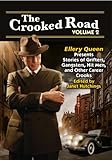A couple of years ago, Janet Hutchings put together a collection of stories first published in Ellery Queen’s Mystery Magazine, where Hutchings has served as editor since 1991. She called this anthology The Crooked Road: Ellery Queen Presents Stories of Grifters, Gangsters, Hit Men, and Other Career Crooks. Now she has given us a sequel (an e-book, like its predecessor).
Crime fiction featuring criminals as protagonists has a long history. One early example is Grant Allen’s An African Millionaire (1897), recently reissued by Penguin Classics, featuring the con man Colonel Clay. More familiar from the same period is Raffles, the gentleman thief whose prowess at cricket allows him to mix freely with potential targets.
These characters, and the stories, novels, movies, and so on in which they appear, cover an enormous range, from Cary Grant’s role in To Catch a Thief to Patricia Highsmith’s sociopathic Ripley. Donald Westlake gave us two long-running series, one in a comic vein, centering on John Dortmunder and his cronies in crime (whose carefully planned capers typically go awry due to circumstances beyond their control), the other in a much different key, centering on the remorselessly violent Parker. Lawrence Block’s Keller, who appears both in the first volume of Crooked Roads and in the new volume, is a stamp-collecting hit man.
Volume 2 includes 17 tales in all. There are stories from late great figures such as Edward D. Hoch and Ed McBain. Veterans such as Peter Lovesey (see LaVonne Neff’s recent piece on him in Books & Culture) and Janice Law make an appearance, as do Edgar Award-winners Doug Allyn and Clark Howard, both of whom had stories in the first volume as well.
There are many fine stories here, but my favorite is Andrew Klavan’s “Killer Christian.” I don’t want to say much about it before you read it, but it’s something special: funny, tender, yet with a Swiftian kick. It should provoke Christian readers in particular to uncomfortable self-examination.
For my many fellow-journalist friends, I have to quote the beginning of Klavan’s story: “A certain portion of my misspent youth was misspent in the profession of journalism. I’m not proud of it, but a man has to make a living and there it is. And, in fact, I learned a great many things while working as a reporter. Most importantly, I learned how to be painstakingly honest and lie at the same time. That’s how the news business works.”
If that doesn’t send you straight to the book, I’ve failed.
John Wilson is the editor of Books & Culture.










